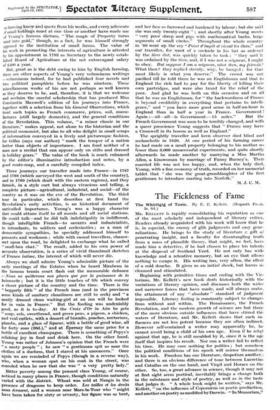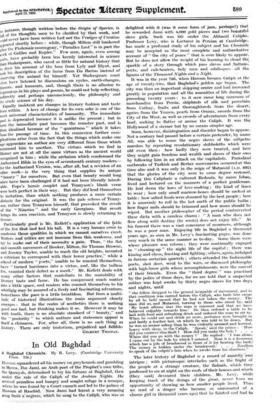The Fickleness of Fame
Ma. liELLErr is rapidly consolidating his reputation as one of the most scholarly and independent of literary critics.
Readers already acquainted with his work will know that he
is, in especial, the enemy of glib judgments and easy gene- ralizations. He brings to the study of literature c, gift of penetrating insight, and a faculty for disentangling truth
from a mass of plausible theory, that might, we feel, have made him a detective, if he had chosen to place his talents
at the disposal of Scotland Yard. He not only has wide knowledge and a retentive memory, but an eye that allows nothing to escape it. His writing has, very often, the effect of a cold douche. It gives us an initial shock, but leaves us cleansed and stimulated.
Beginning with primitive times and ending with the Vic- torians, Mr. Kellett's new book deals historically with the
variations of literary opinion, and discusses both the wider and narrower forces that have made, and will always make. the attainment of any " absolute" standard of judgment impossible. Literary feeling is constantly subject to changes from without and within. The Renaissance, the French Revolution, and the modern growth of science are but three of the more obvious outside influences that have stirred the waters of literature, and Mr. Kellett shows that , such in- fluences are not less potent because they are often indirect. However self-contained a writer may apparently be, he cannot avoid being a child of his own age. Even if he rebel against that age, he is still moulded by it, since it is the age itself that inspires his revolt. Nor can a writer fail to reflect his time. He may care nothing for politics ; but somehow the political conditions of his epoch will mirror themselves in his work. Freedom has one literature, dispotism another,: and there is an obvious difference of tone between Lucretius and Catullus on the one hand, and Virgil and Horace on the other. So, too, a great advance in science, though it may not at first sight seem poetical, inevitably biings a change both in the substance and style of poetry, as well as in the taste that judges it. " A whole book might be written," says Mr. Kellett, "won the influence tit Copernicus on poetic production, -and another on poetry as modified by Darwin.." In Memoriam," or instance; though written- before the Origin of Species, is fa of the thoughts soon to be clarified by that work, and mum never have been written had not the Vestiges of Creation iffeared shortly before : while, though Milton still hankered after the Ptolemaic cosmogony, "Paradise Lost" is in part the nark of Galileo and Kepler." Few men, again, even among poets, have probably been less keenly interested in science than Shakespeare, who cared so little for natural history that he drew his account of the bees from Lyly and Elyot, and took his description of the horse from Du Bartas instead of observing the animal for himself. Yet Shakespeare must often have listened .to discussions on cycles, earth-changes, diseases, and humours, and, though there is no allusion to Copernicus in his plays and poems, he could not help reflecting, indirectly and perhaps unconsciously, the philosophy and the crude science of his day.
Equally insistent are changes in literary fashion and taste from within. A love of change for its own sake is one of the most universal characteristics of humanity. The immediate past is deprecated because it is unlike the present ; but in turn the immediate past becomes the remoter past, and is then idealized because of the " quaintness " which it takes from the passage of time. In this connexion further com- plications arise from the fact that the things which make one age appreciate an author are very different from those which commend him to another. The virtues which we find in Homer are not at all the same virtues as the ancient world recognized in him ; while the archaism which condemned the Authorized Bade in the eyes of seventeenth century readers— for the Authorized Version, was, after all, but a revision of an older work—is the very thing that supplies its unique "beauty " for ourselves. But even that beauty would long since have been challenged if it had not been literally inimit- able. Pope's heroic couplet and Tennyson's blank verse were both perfect in their way. But they did lend themselves to imitation, than which nothing produces a more certain distaste for the original. It was the pale echoes of Tenny- son, rather than Tennyson himself, that provoked the revolt of the " Nineties " and the early Georgians. But revolt brings its own reaction, and Tennyson is slowly returning to favour.
Particularly good is Mr. Kellett's application of the sable of the fox that had lost his tail. It is a very human error to condemn those qualities in which we cannot ourselves excel. Writers and critics are not immune from this weakness, and try to make out of their necessity a gain. Thus, " the flat and smooth successors of Hooker, Milton, Sir Thomas Browne, and Jeremy Taylor, unable to reach the old heights, invented a criticism to correspond with their lower practice," while a school of modern " poets," unable to be musical themselves, have " turned harshness into a virtue, and, like the tailless fox, vaunted their defect as a merit." Mr. Kellett deals with many other factors that contribute to the mutability of literary taste and fame. He has compressed much matter into a little space, and readers who commit themselves to his whirligig may be assured of a lively and fascinating adventure. Sometimes the pace is a little breathless. But from a multi- tude of historical illustrations the main argument clearly emerges : that in the realm of aesthetics there is nothing good nor bad, but thinking makes it so. However it may be with truth, there is no absolute standard of " beauty," and the " posterity " to which authors and statesmen appeal is Itself a chimaera. For, after all, there 'is no such thing as history. There are only historians, prejudiced and fallible.
GILI3ERT THOMAS.



















































 Previous page
Previous page